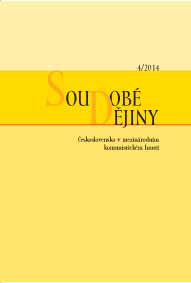Československo ve střetu Moskvy a Pekingu o mezinárodní komunistické hnutí (1953–1962)
Between Two Suns: Czechoslovakia in the Conflict over the International Communist Movement, 1953–62
Author(s): Daniela KolenovskáSubject(s): History
Published by: AV ČR - Akademie věd České republiky - Ústav pro soudobé dějiny
Summary/Abstract: In this article, the author traces the changes in the Czechoslovak position in the international Communist movement after the Communist Party took power in Czechoslovakia. She concentrates on the Party’s relations with the Soviet and the Chinese Communists, which from the 1950s onwards represented two competing centres of power in world Communism. She argues that in Czechoslovak foreign policy the Communists subordinated the defence of State interests to the international solidarity of the workers, and, in keeping with that ideological guideline, the tasks of Czechoslovak foreign policy were set mainly according to the Soviet agenda and its vaguely defined aims for the international Communist movement. Prague became dependent on Moscow for personnel, information, and material, and lost the ability to act independently in international politics both outside and inside the Soviet bloc. Amongst Prague’s priorities were efforts to achieve the unity of the Soviet system of alliances and, beginning at the latest in 1956, it considered military intervention a suitable instrument in the event of a threat to that system. A comparative analysis of records for the ten years from 1953 to 1962, from the Archive of the Ministry of Foreign Affairs of the Czech Republic and from the Czechoslovak Communist Party leadership, which are deposited in the National Archive, Prague, demonstrate that Czechoslovak foreign policy was actually formed by way of inter-Party contacts. The Soviet Communists were paramount in the hierarchy; in the eyes of the Czechoslovak Communists, the Soviet position remained unchallenged by any Chinese attempts to provide an alternative to Soviet methods and plans to develop the international Communist movement in the late 1950s and early 1960s. Indeed, at multilateral talks amongst dozens of Communist Parties in Moscow in November 1957 and in 1960, where Chinese objections were discussed, Czechoslovak Communists arrived after having been instructed by their Soviet comrades, and from this position they rejected all Chinese activities, despite Czechoslovak efforts to establish friendly and close ties with their Beijing comrades after 1948. As a result of this linking of Czechoslovak Party and State matters, Czechoslovak-Chinese collaboration ceased in the early 1960s, and the Soviet Union promised to compensate for any damages that thus accrued to the Czechoslovak economy.
Journal: Soudobé Dějiny
- Issue Year: XXI/2014
- Issue No: 04
- Page Range: 531-558
- Page Count: 28
- Language: Czech

